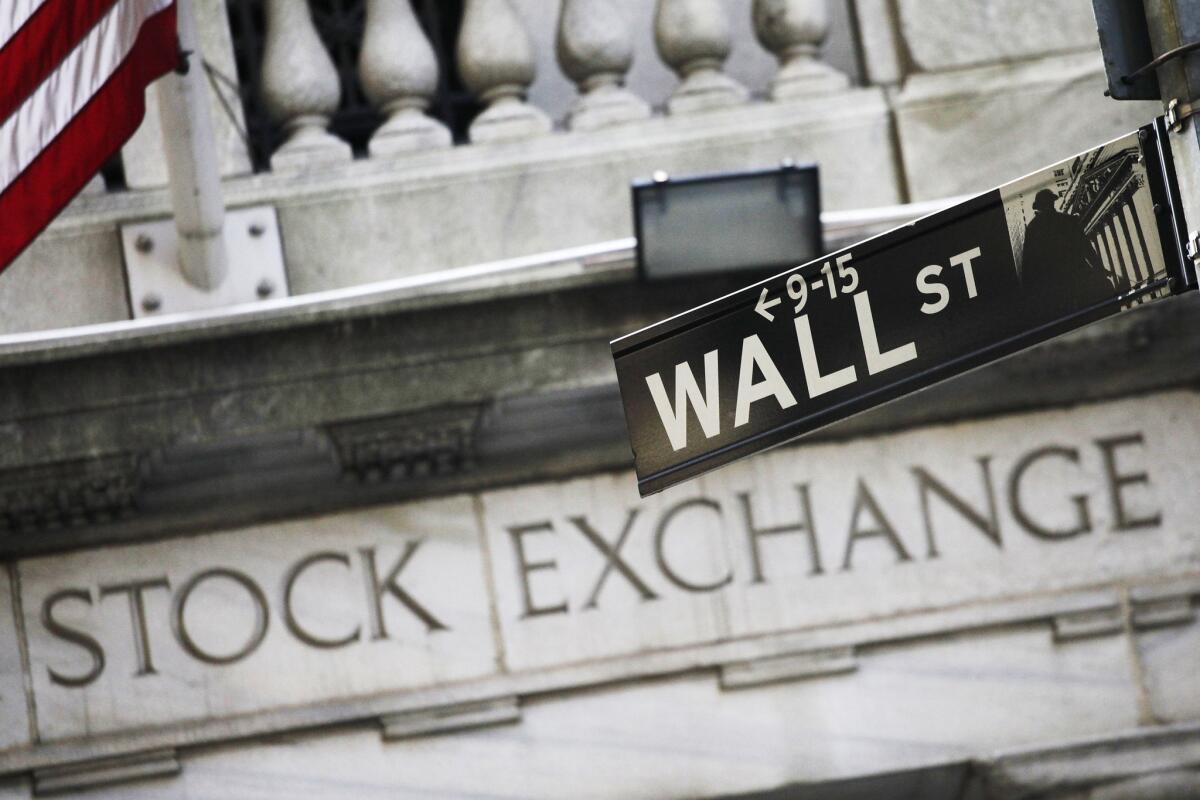Wall Street pauses, and S&P 500’s four-day winning streak snaps

- Share via
Wall Street paused on Thursday, and the Standard & Poor’s 500 index fell for the first time in five sessions as stocks that had held steadiest through this year’s feverish swings gave back some of their gains.
The S&P 500 lost 10.52 points, or 0.3%, to 3,112.35 after being on track earlier in the day for its longest winning streak since December. The Dow Jones industrial average rose 11.93 points, or less than 0.1%, to 26,281.82, and the Nasdaq composite fell 67.10, or 0.7%, to 9,615.81.
A report showed that the number of U.S. workers filing for unemployment benefits eased for a ninth straight week, roughly in line with the market’s expectations. But economists saw pockets of disappointment after the total number of people getting benefits rose slightly. That number had dropped the prior week, which had raised hopes that some companies were rehiring workers.
Many professional investors have been arguing that the stock market’s rally, which had reached nearly 40% since late March, was overdone and that a pullback probably was coming. Stocks began surging following massive aid for the economy from Washington. More recently, they’ve climbed on optimism that the recession created by the reaction to the coronavirus outbreak could end relatively quickly as states and countries lift lockdown restrictions.
Critics point to how the gains for stocks seem to assume a quicker recovery for the economy than some economists expect, along with the risks of rising U.S.-China tensions and the possibility of second waves of coronavirus infections.
The next big piece of economic data to bolster or weaken the market’s optimism about the economy’s prospects lands early Friday, when the Labor Department releases its monthly jobs report for May. Economists expect it to show employers slashed 8.5 million jobs last month, down from 20.5 million in April, and that the unemployment rate jumped to 19.8% from 14.7%.
Continuing a recent trend, investors Thursday were cycling out of stocks that had held up the best when the hunt was for companies that can win in a weak, stay-at-home economy. Instead, investors moved into some areas of the market whose fortunes would benefit most from a healthier economy.
Losses for technology stocks and healthcare companies were some of the heaviest weights on the market. Microsoft slipped 1.3%, Johnson & Johnson fell 1.3% and UnitedHealth Group lost 2.4%.
Other falling stay-at-home winners included Netflix, down 1.8%, and Clorox, down 0.8%.
On the winning end were airlines. American Airlines surged 41.1% for the biggest gain in the S&P 500 after it said it plans to fly 55% of its normal U.S. schedule next month. That’s up from only 20% in April, as demand for travel inches back toward normal amid the pandemic.
Banks and industrial stocks were also strong amid hopes that a resumption in growth for the economy will limit loan losses and allow for better sales orders.
Charles Schwab Corp. rose 5.5% after it said antitrust regulators won’t block its acquisition of TD Ameritrade. The companies expect the deal to close in the second half of this year.
The S&P 500 index is now within 8.1% of its record set in February after earlier being down nearly 34%.
Longer-term Treasury yields rose decisively. That area of the market had been one of the first to warn of the coming economic devastation from the coronavirus outbreak, and it has been much more circumspect in recent weeks than the U.S. stock market.
The yield on the 10-year Treasury rose to 0.81% from 0.76% late Wednesday. It tends to move with investors’ expectations for inflation and the economy’s strength.
European stocks were weaker after the European Central Bank said it expects the region’s economy to shrink 8.7% this year due to the pandemic. It also announced it was nearly doubling its rescue program to help the economy.
The French CAC 40 was down 0.2%, Germany’s DAX lost 0.5% and the FTSE 100 in London dropped 0.6%.
Asian stocks were stronger. Japan’s Nikkei 225 rose 0.4%, South Korea’s Kospi added 0.2% and the Hang Seng in Hong Kong picked up 0.2%.
A barrel of U.S. crude oil for delivery in July rose 12 cents to settle at $37.41. Brent crude, the international standard, rose 20 cents to settle at $39.99 per barrel.
More to Read
Inside the business of entertainment
The Wide Shot brings you news, analysis and insights on everything from streaming wars to production — and what it all means for the future.
You may occasionally receive promotional content from the Los Angeles Times.










